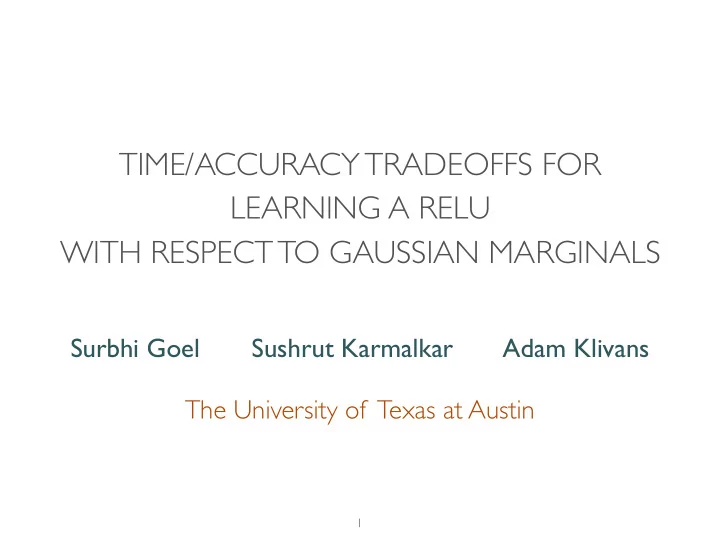

TIME/ACCURACY TRADEOFFS FOR LEARNING A RELU WITH RESPECT TO GAUSSIAN MARGINALS Surbhi Goel Sushrut Karmalkar Adam Klivans The University of Texas at Austin 1
̂ ̂ WHAT IS RELU REGRESSION? Given : Samples drawn from distribution with arbitrary labels Output : w ∈ ℝ d such that [ ( 𝗌𝖿𝗆𝗏 ( ] ≤ 𝗉𝗊𝗎 + ϵ 2 w ⋅ x ) − y ) 𝔽 test error w ( 𝔽 ] ) [ ( 𝗌𝖿𝗆𝗏 ( w ⋅ x ) − y ) 2 𝗉𝗊𝗎 := min loss of the best-fitting ReLU 𝗌𝖿𝗆𝗏 ( a ) = max(0, a ) 2
̂ ̂ WHAT IS RELU REGRESSION? Given : Samples drawn from distribution with arbitrary labels Output : w ∈ ℝ d such that [ ( 𝗌𝖿𝗆𝗏 ( ] ≤ 𝗉𝗊𝗎 + ϵ 2 w ⋅ x ) − y ) 𝔽 test error w ( 𝔽 ] ) [ ( 𝗌𝖿𝗆𝗏 ( w ⋅ x ) − y ) 2 𝗉𝗊𝗎 := min loss of the best-fitting ReLU 𝗌𝖿𝗆𝗏 ( a ) = max(0, a ) The underlying optimization problem is non-convex! 2
PRIOR WORK - POSITIVE Mean-zero noise: Isotonic regression over Sphere [Kalai-Sastry’08, Kakade- Kalai-Kanade-Shamir’11] Noiseless: Gradient descent over Gaussian input [Soltanolkotabi’17] 3
PRIOR WORK - POSITIVE Mean-zero noise: Isotonic regression over Sphere [Kalai-Sastry’08, Kakade- Kalai-Kanade-Shamir’11] Noiseless: Gradient descent over Gaussian input [Soltanolkotabi’17] Results require strong restrictions on the input or the label 3
PRIOR WORK - NEGATIVE Minimizing training loss is NP-hard [Manurangsi-Reichman’18] Hardness over uniform on the boolean cube [ G -Kanade- K -Thaler’17] 4
PRIOR WORK - NEGATIVE Minimizing training loss is NP-hard [Manurangsi-Reichman’18] Hardness over uniform on the boolean cube [ G -Kanade- K -Thaler’17] Results use special discrete distributions to prove hardness 4
DISTRIBUTION ASSUMPTION Assumption: For all ( x , y ) ∼ x ∼ 𝒪 (0, I d ) and y ∈ [0,1] , 5
DISTRIBUTION ASSUMPTION Assumption: For all ( x , y ) ∼ x ∼ 𝒪 (0, I d ) and y ∈ [0,1] , Gaussian input allows for positive results in noiseless setting [Tian’17, Soltanolkotabi’17, Li-Yuan'17, Zhong-Song-Jain-Bartlett-Dhillon'17, Brutzkus- Globerson’17, Zhong-Song-Dhillon17, Du-Lee-Tian-Poczos-Singh’18, Zhang-Yu-Wang- Gu’19, Fu-Chi-Liang’19…….] 5
DISTRIBUTION ASSUMPTION Assumption: For all ( x , y ) ∼ x ∼ 𝒪 (0, I d ) and y ∈ [0,1] , Gaussian input allows for positive results in noiseless setting [Tian’17, Soltanolkotabi’17, Li-Yuan'17, Zhong-Song-Jain-Bartlett-Dhillon'17, Brutzkus- Globerson’17, Zhong-Song-Dhillon17, Du-Lee-Tian-Poczos-Singh’18, Zhang-Yu-Wang- Gu’19, Fu-Chi-Liang’19…….] Explicitly compute closed-form expressions for loss/gradient 5
HARDNESS RESULT There exists NO algorithm for ReLU regression up to d o ( log(1/ ϵ ) ) error in time under standard ϵ computational hardness assumptions. 6
HARDNESS RESULT There exists NO algorithm for ReLU regression up to d o ( log(1/ ϵ ) ) error in time under standard ϵ computational hardness assumptions. The problem is as hard as learning sparse parities with noise! 6
HARDNESS RESULT There exists NO algorithm for ReLU regression up to d o ( log(1/ ϵ ) ) error in time under standard ϵ computational hardness assumptions. The problem is as hard as learning sparse parities with noise! First hardness result under the Gaussian assumption! 6
HARDNESS FOR GRADIENT DESCENT Unconditionally, NO statistical query (SQ) algorithm with bounded norm queries can perform ReLU regression up d o ( log(1/ ϵ ) ) to error with less than queries. ϵ 7
HARDNESS FOR GRADIENT DESCENT Unconditionally, NO statistical query (SQ) algorithm with bounded norm queries can perform ReLU regression up d o ( log(1/ ϵ ) ) to error with less than queries. ϵ Gradient Descent (GD) is well-known to be an SQ algorithm 7
HARDNESS FOR GRADIENT DESCENT Unconditionally, NO statistical query (SQ) algorithm with bounded norm queries can perform ReLU regression up d o ( log(1/ ϵ ) ) to error with less than queries. ϵ Gradient Descent (GD) is well-known to be an SQ algorithm GD can NOT solve ReLU regression in polynomial time 7
HARDNESS FOR GRADIENT DESCENT Unconditionally, NO statistical query (SQ) algorithm with bounded norm queries can perform ReLU regression up d o ( log(1/ ϵ ) ) to error with less than queries. ϵ Gradient Descent (GD) is well-known to be an SQ algorithm GD can NOT solve ReLU regression in polynomial time Recall GD works in noiseless setting [Soltanokotabi’17] 7
APPROXIMATION RESULT There exists an an algorithm for ReLU regression with O ( 𝗉𝗊𝗎 2/3 ) + ϵ poly ( d ,1/ ϵ ) error in time . 8
APPROXIMATION RESULT There exists an an algorithm for ReLU regression with O ( 𝗉𝗊𝗎 2/3 ) + ϵ poly ( d ,1/ ϵ ) error in time . O ( 𝗉𝗊𝗎 ) + ϵ poly ( d ,1/ ϵ ) Can get in time [Diakonikolas- G - K - K -Soltanolkotabi’TBD] 8
APPROXIMATION RESULT There exists an an algorithm for ReLU regression with O ( 𝗉𝗊𝗎 2/3 ) + ϵ poly ( d ,1/ ϵ ) error in time . O ( 𝗉𝗊𝗎 ) + ϵ poly ( d ,1/ ϵ ) Can get in time [Diakonikolas- G - K - K -Soltanolkotabi’TBD] Finding approximate solutions is tractable! 8
THANK YOU! Poster @ East Exhibition Hall B + C #235
Recommend
More recommend